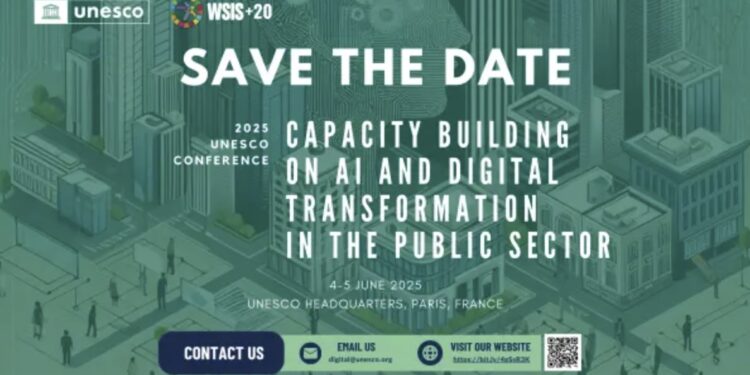The recent UNESCO Global Conference on Capacity Building on AI and Digital Transformation in the Public Sector” on June 4-5, 2025 at its headquarters in Paris, ended with a clear focus on capacity-building for civil servants and the promotion of ethical innovation within governments around the world.
The 2-day forum convened senior government officials, UN agency executives, academics, and innovators to map the way forward on how to operationalize the digital readiness of the public sector.
Key among conference themes was the dire need to ensure that there is no “AI without human rights” – with the public sector personnel being able to competently utilise AI, in a manner that is consistent with human rights.
Conversations emphasized the important distinction between current practices of public procurement and the specific challenges of AI systems, notably with respect to algorithmic harm to marginalized groups. UNESCO’s “AI for the Public Sector” programme, underway prior to the pandemic and having upskilled public servants in over 50 countries, was presented as an example of building transparent, efficient and inclusive AI-powered public services.
Key results and discussion were focused in several important areas. The conference highlighted the need for human-centered design principles for the development of AI for public services to ensure the development and adoption of technology which enables a focus on the well-being and accessibility of citizens.
They interrogated the basics of AI such as predictive analytics and generative AI, examined approaches to human rights-based governance and public service design. During Project-based learning sessions, attendees designing AI-based public services including a civic engagement platform to efficiently addressing citizen issues.
The conference also highlighted the UNESCO Recommendation on the Ethics of Artificial Intelligence, adopted 2021, as a touchstone global standard. This advice is to ALL 194 member states and is focused on human rights and dignity, transparency, fairness and human agency for AI systems. The need for strong data governance, sustainability as a factor and multi-stakeholder cooperation in the deployment of AI was also a frequent subject.
The occasion was timed to coincide with World Environment Day, thereby underlining the importance to UNESCO of the sustainable digital transformation, and the ways in which AI can help with responsible environmental governance. In the coming months, the results of the conference are expected to make substantial contributions to the GDC and the WSIS+20 process, setting the stage for a future-oriented global digital agenda that emphasizes inclusive and human rights-based digital futures.
There is strong agreement on at least one issue: continued skilling and re-skilling through ethical frameworks and international cooperation are the necessary baseline for any successful AI integration in the public sector, so no country or person is left behind in the rapidly-changing digital world.










![Online Scam Cases Continue to Rise Despite Crackdowns on Foreign Fraud Networks [Myanmar] Online Scam Cases Continue to Rise Despite Crackdowns on Foreign Fraud Networks [Myanmar]](https://sumtrix.com/wp-content/uploads/2025/06/30-12-120x86.jpg)




